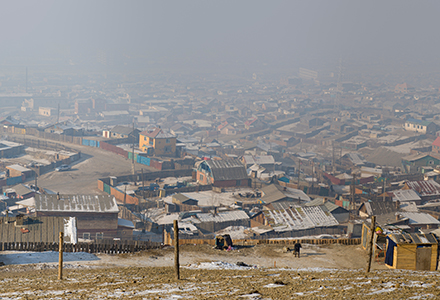By Lee Cannon

(Photo Courtesy of UTMB Galveston GEOHealth Team)
In 2024, the National Institute of Environmental Health Sciences (NIEHS), along with the John E. Fogarty International Center for Advanced Study in the Health Sciences, began supporting a U.S.-international partnership to better understand the interplay between air pollution and respiratory viruses.
A team of researchers from Duke University, the University of Texas Medical Branch, and the Mongolian National University of Medical Sciences (MNUMS) collectively makes up the Mongolian Center for Environmental and Occupational Health.
Because Mongolia has some of the highest ambient particulate matter (PM) concentrations in the world, as well as frequent viral respiratory disease epidemics, it is a fitting location to study how air pollution may weaken the immune system’s defense against viral lung infections.
“The Mongolian Center is enhancing the research capacity of Mongolian institutions through research training in coordination with partner U.S. universities,” explained Fogarty’s Christine Jessup, Ph.D., the NIH program officer for the Mongolian Center.
The team is also conducting human and cell culture studies on 100 nonsmoking adults and their families, collecting health data, home air samples, and biological specimens for three years. The researchers will examine the participants’ immunological and viral responses to their personal PM exposure. They will also track the ways PM exposure affects the ability of epithelial cell barriers to block viruses; how well immune cells communicate with each other and other cells; and how those factors, in turn, impact the immune system’s anti-viral responses.
Additionally, in two pilot studies, the researchers will specifically examine the effects of PM on pulmonary tuberculosis, as well as how heavy metals in PM may contribute to bone mineral loss.
Knowledge gained from these studies may inform policies that can benefit population health in areas with high levels of outdoor air pollution, including certain regions of the U.S.
The Mongolian Center is part of the NIH Global Environmental and Occupational Health Hubs program that pairs U.S. institutions with those in in low- and middle-income nations to share findings and answer questions applicable to all populations.


